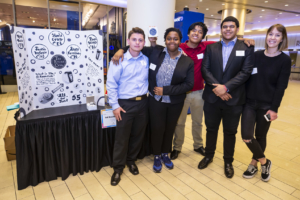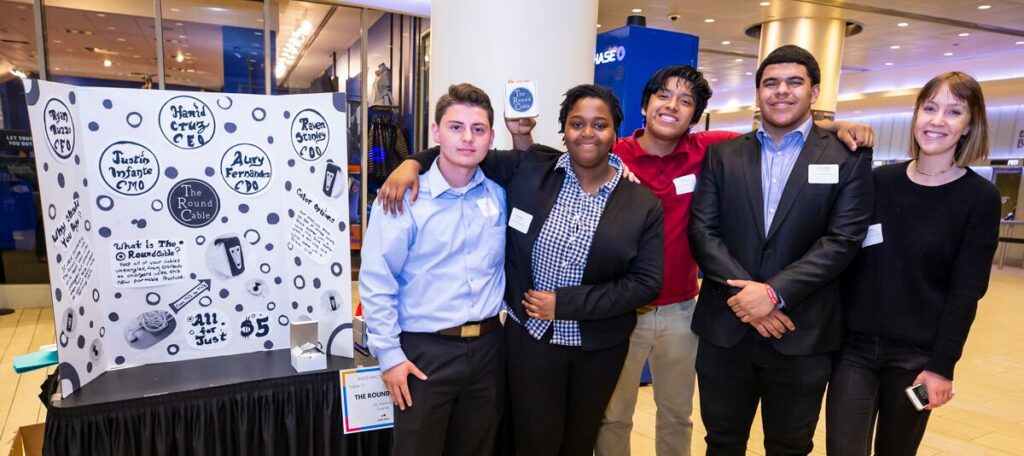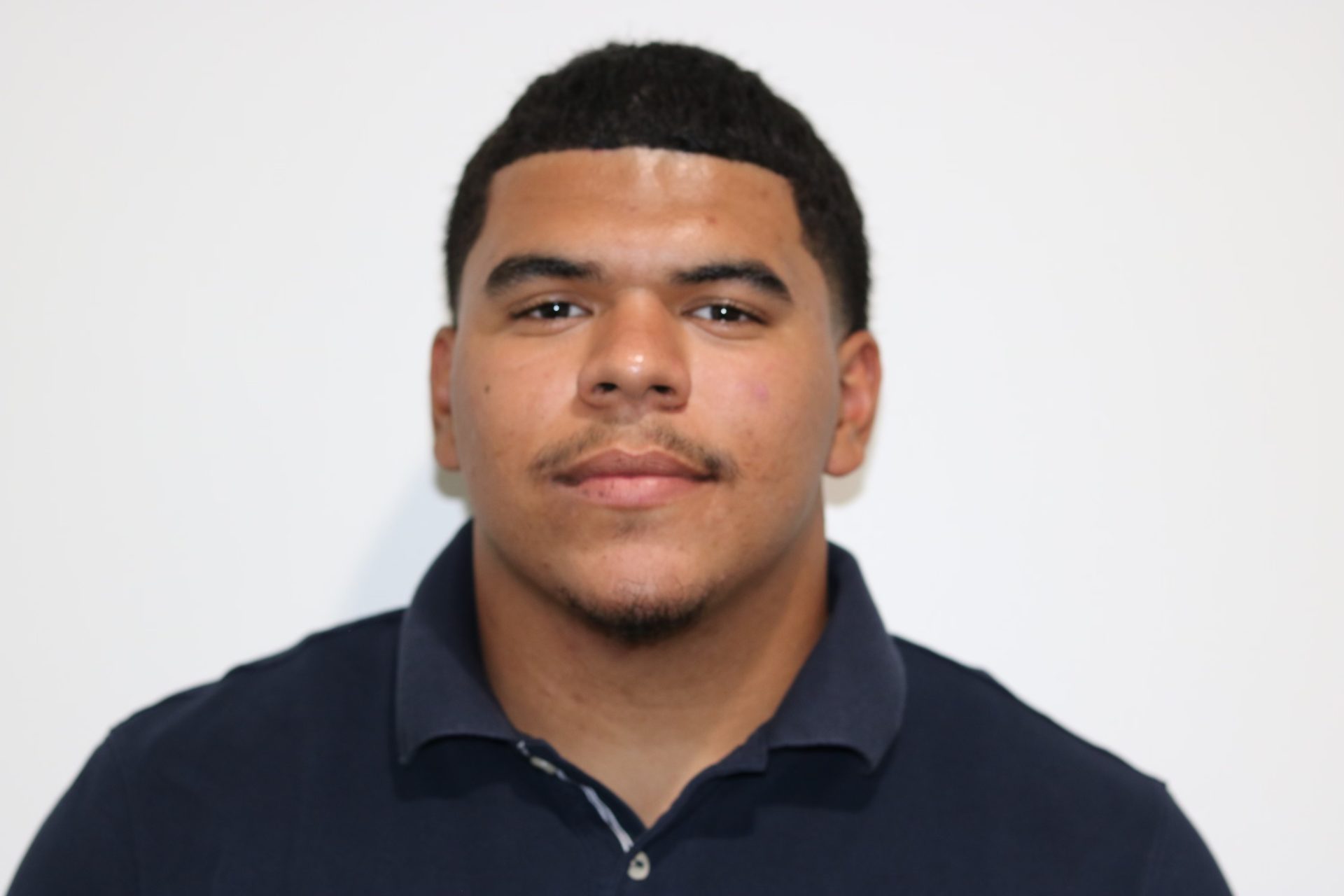BUILD showed me a lot of gateways when it came to my career path, especially the basics of becoming a professional in whatever field I chose.
Aury Fernandez
As we approach National Entrepreneurship Week beginning February 11, 2023, we wanted to share how BUILD is helping young learners become the CEOs of their own lives. We had the chance to sit down with Aury Fernandez. Currently a sophomore at the Rensselaer Polytechnic Institute, Aury was involved with BUILD as a high school entrepreneur in Washington Heights, NY and now serves on BUILD’s Youth Advisory Panel (YAP).
Q: Could you tell us about your experience in the BUILD Program?
Aury: I started in 2018 when I was a sophomore in high school. All of my peers and friends were part of it the year prior, and I would always walk past the classroom and see them constructing their business products and ideas. I really wanted to be part of it. The next year, I enrolled as soon as possible.

Aury Fernandez, BUILD Alumni and YAP Fellow, at the 2019 BUILD Selling Event at Madison Square Garden in NYC
I learned a lot about discipline and life through BUILD, especially through the pitch competition for my company. My team created a product called Round Cable. It’s a little object that allows you to organize all of your wires – headphones, chargers, or miscellaneous wires. We were able to go downtown and pitch it, competing with other schools across the city. My team won. It was just so much fun! We got a little money out of it, but meeting all of those people was the best part of the experience.
It was my first time being in a professional environment. I was 13, wearing a suit, speaking professionally, and carrying myself with confidence. BUILD showed me a lot of gateways when it came to my career path, especially the basics of becoming a professional in whatever field I chose.
We got to solve problems along the way, too. When it came to producing the product, the biggest challenge was durability. A lot of the materials we were using weren’t very sturdy, so it became an issue of longevity to make sure our product was something worth selling and that someone would want to buy and not regret it. We experimented with different materials, and BUILD gave us the time, money, and freedom to explore these different ideas as young entrepreneurs.
Q: Did you have a BUILD Mentor? What was that experience like for you?
Aury: There are so many wonderful people that I can’t say I had just one mentor. But, Cindy Pineda was one of the biggest influences in my life. Her being a Latina woman and experiencing a lot of the same things that I would come to experience as a Hispanic man meant a lot. She was able to give me a little bit of guidance on how to prepare for things that not everybody else experiences, how to react when it comes to certain situations, and how to ultimately be mentally strong and have the fortitude to continue pursuing my goals and not let anything get to me.
I’d also give props to another professor of mine from back in high school, Mr. Ferguson. He really taught me how to orchestrate my mind in a way that I could develop my creativity. His advice really allowed me to broaden the potential of my goals. He would tell us stories of how he used to work for tech companies, and I would think, “Is that really in my scope?” But then I would look at Ferguson, a guy who looks like me and spoke the same way I did, and he was able to have those experiences that I wanted to. He was one of the people who really opened the gateway for what I now think is possible for my career path.
There are a lot of experiences that BUILD offers their students, whether it comes from the pitch meetings, from the business environment that you’re placed in, or the different opportunities when it comes to your career path.
Aury Fernandez
Q: How do you think you’ve grown as a person through the BUILD experience?
Aury: Maturity is one thing that BUILD skyrocketed for me. There are a lot of experiences that BUILD offers their students — the pitch meetings, the business environment that you’re placed in, or the different opportunities when it comes to your career path. Those are things not everybody gets to experience. I want my brother and sister who are 13 and 17 to join a BUILD program, so they can have the same experiences that I did.
BUILD also showed me the importance of discipline and time management. There is also the general experience of being exposed to different career paths and seeing the options out there. Some of the seminars I attended influenced me to become a design student in college, and now that I’m here, I can follow my career path in many directions — opportunities such as automotive, prosthetics, toy making, or anything else. Those seminars allowed me to broaden my understanding of what I want to do with my career.
Thinking back, it’s the number one experience I’ve ever gone through. It will teach you so much as a person — how life really works, how to run a business, how to work with people, how to manage your own time, how to build yourself to a point where you don’t need anybody else to do what you want to do in your life. But at the same time, you are still able to work in a group and meet people and make people smile. That’s really what it is for me. Everything BUILD has taught me, has given me the skills to make other people smile. And, that’s what I want for my life.
Q: What advice do you have for student entrepreneurs?
Aury: This may sound a little rude, but in design school, they say, “Kill your darlings.” Basically, do not become over-infatuated with one idea where it limits you from creating an even better idea in the future. Overall, keep an open mind as you continue to work towards your goals.
Q: What inspired you to join BUILD’s Youth Advisory Panel (YAP) after graduating high school?
Aury: It was a program recommended to me by a mentor, and because the message of it spoke to me, I decided to join. The YAP, which was developed and funded through a joint partnership with the Bill & Melinda Gates Foundation, is trying to show its students and the rest of the country how we can incorporate our identities into the education system. Being a minority at a predominantly white school, I want to be able to show the next generation that we are represented well in the education system, especially in mathematics.
Recently, we partnered with a math-based company to survey learners to help us define what a mathematics program could look like for a student and how we can improve the program. Coming from a New York City public school, I give a lot of respect and props to all of my teachers who helped raise me, but there are many resources that aren’t given to them and students fall behind. I want my experiences and everything I know now to help students in the future to have resources that I didn’t. It’s an honor to hopefully have an impact on what education will look like in the next five, 10, or 20 years.
Q: What do you think the future of education should or will look like?
Aury: In one word: diversity. I think we’ll come to a point where every person’s education is distributed in a way that best fits the student’s needs and how they learn the most effectively. We could tailor classwork to students who have particular interests. I hope in the near future, education will include every single student’s needs and interests into the education they’re experiencing.

